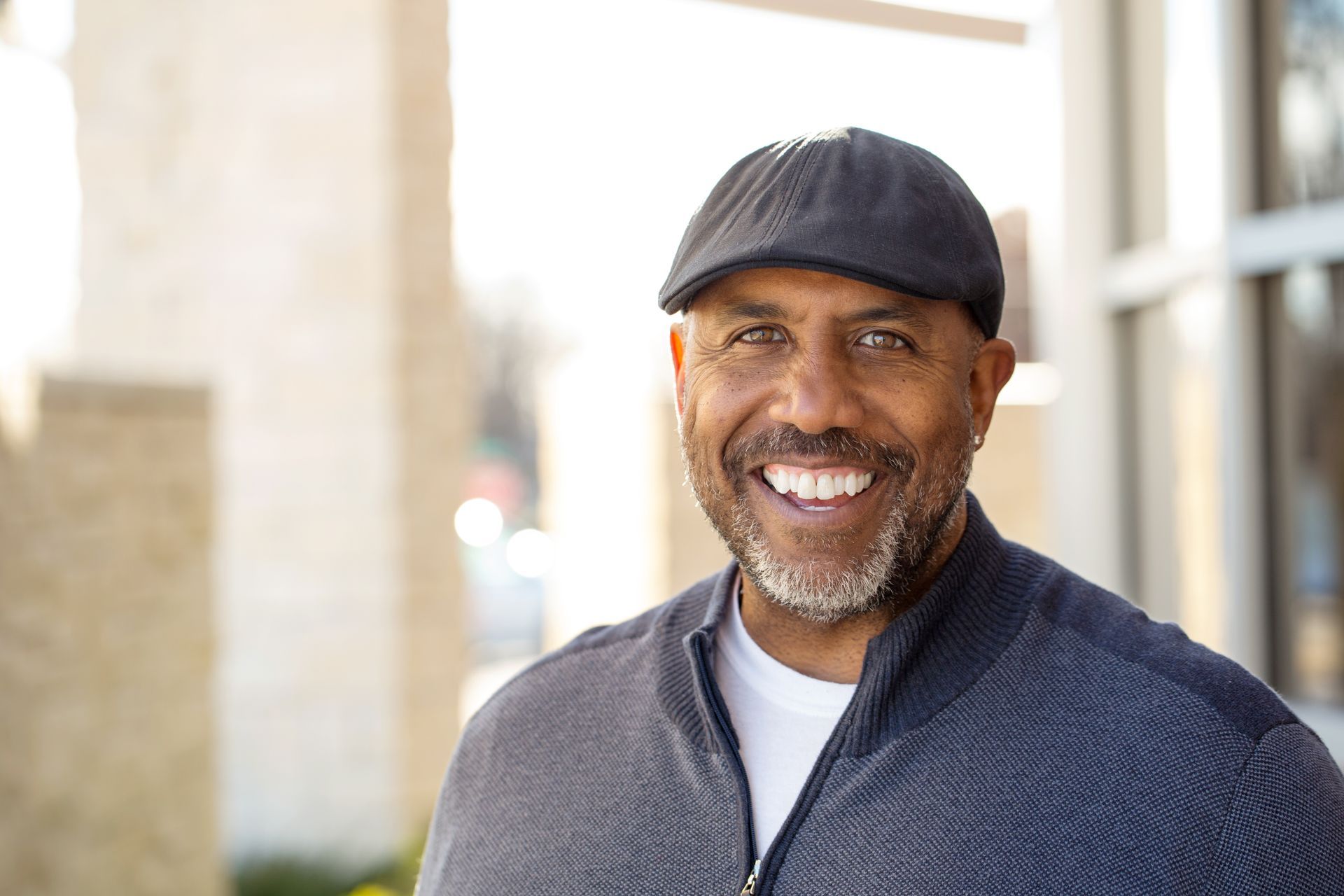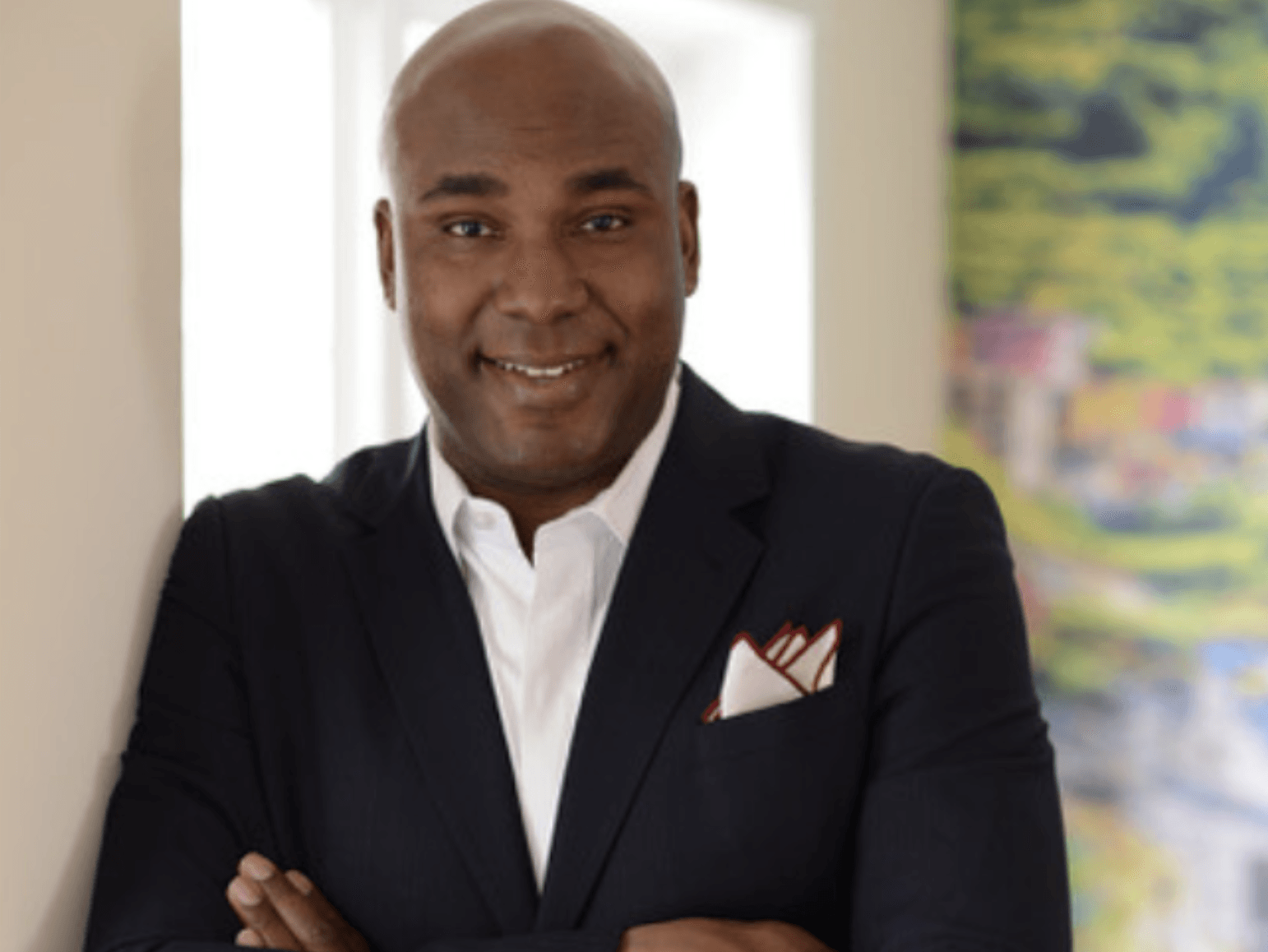WHERE MISSION-DRIVEN LEADERS SHAPE THE FUTURE OF BUSINESS AND COMMUNITY
Principles for Success

Steve Harvey, a man of many talents, has donned various hats in his career—comedian, TV host, author, and motivational speaker, to name a few. His journey from humble beginnings to stardom is both inspirational and instructive. Here are seven lessons that we can all learn from Steve Harvey's remarkable career trajectory. 1. Embrace Failure as a Learning Opportunity Steve Harvey was not an overnight sensation. He faced numerous setbacks, including homelessness, before achieving the success he enjoys today. Harvey often says that failure is a great teacher. When faced with setbacks, don’t get discouraged; instead, look for the lessons and ways to improve. 2. Hard Work and Persistence Pay Off The grind never stops when you're working towards your dream. Steve Harvey exemplifies the dedication and hard work required to succeed in multiple fields. His message is clear: you have to commit yourself fully to your dreams and work persistently to make them come true. 3. Make Time for Family and Loved Ones Despite his demanding career, Harvey places great importance on spending quality time with family. He often discusses the support and inspiration he derives from his loved ones, highlighting the essential balance between professional and personal life. Never underestimate the power of a strong support system. 4. Create Multiple Streams of Income Steve Harvey is not just a comedian or TV host; he is also a bestselling author and entrepreneur. His diverse career portfolio shows the wisdom in not putting all your eggs in one basket. It's a powerful reminder to diversify our skills and sources of income to ensure financial stability and independence. 5. Always Give Back to the Community One of Harvey’s key beliefs is the importance of giving back. Through various charitable initiatives and public talks, he actively contributes to his community and encourages others to do the same. Giving back is not only socially responsible but also personally fulfilling. 6. Maintain a Positive Mindset and Attitude Positivity is contagious, and nobody proves that better than Steve Harvey. He consistently emphasizes the power of maintaining a positive outlook on life, regardless of the circumstances. Harvey advises that a positive mindset can help you overcome obstacles and attract opportunities you'd otherwise miss. 7. Trust in Your Unique Journey Every person’s path to success is different, and Steve Harvey is a testament to that. His unique journey, filled with various career changes and life lessons, shows that there is no single “correct” way to achieve your dreams. Trust in your own journey and don't be discouraged by the seemingly perfect paths of others. Steve Harvey's life and career offer a wealth of wisdom for anyone striving to achieve personal and professional success. His resilience, work ethic, and positive outlook provide a framework for us all. Apply these seven lessons in your own life, and who knows, you might just find yourself on the path to fulfilling your wildest dreams.

When Mellody Hobson speaks about money, people listen—and for good reason. As a nationally respected financial expert, co-CEO of Ariel Investments, and longtime advocate for financial literacy, Hobson has a gift for breaking down complex money matters into everyday truths that stick. Through her powerful insights and plain-spoken wisdom, she’s taught millions how to not only manage money but master it. Whether she’s speaking on “Mellody on Money” or in the boardroom, her advice is honest, empowering, and deeply practical—especially for those who’ve been left out of traditional wealth-building conversations. Here are 10 priceless facts about money we’re learning from the incomparable Mellody Hobson—truths that can shift your mindset, change your habits, and put you on the path to lasting financial freedom. 1. Know Where Every Dollar Goes Track your spending like your life depends on it—because your financial freedom does. Use budgeting apps (like Mint, YNAB, or even spreadsheets). Categorize every purchase to see where you’re bleeding money (subscriptions, eating out, etc.). 2. Your Net Worth Matters More Than Your Paycheck It’s not what you earn, it’s what you keep—and grow. Subtract your liabilities (debt) from your assets (what you own). Regularly calculate your net worth so you know if you’re building wealth or just staying busy. 3. Stop Using Credit Like It’s Cash Credit cards are tools, not free money. If you can’t pay it off in full monthly, don’t swipe it. Limit credit card use to what you can pay off within 30 days. 📉 4. Avoid “Financial Amnesia” Tip : Don’t forget big money lessons after things get comfortable again. Keep a money journal. Reflect on past financial mistakes and what you learned. Set automatic savings even during stable times to build resilience. 💡 5. Financial Literacy = Financial Power Tip : The more you learn, the more you earn—and protect. Read books, listen to podcasts, and follow reputable financial voices. Take free online courses (Khan Academy, Coursera, etc.) on personal finance and investing. 🧠 6. Money Is Emotional—But Don’t Let It Run You Tip : Be honest about your emotional triggers around money. Ask yourself: Do I spend to feel better? Do I avoid looking at my bank account out of fear? Practice mindful money habits and check in weekly. 📈 7. Start Investing Early, Even If It’s Small Tip : Time in the market beats timing the market. Open a Roth IRA, 401(k), or use apps like Acorns or Betterment to start small. Automate contributions and increase them as your income grows. 🔐 8. Protect Your Future with Insurance & Estate Planning Tip : Wealth isn’t just what you grow—it's what you protect. Get life, health, and disability insurance. Create a will and healthcare directive, especially if you have children. 🤝 9. Talk About Money Tip : Silence keeps communities broke. Conversation creates change. Break money taboos with family and friends. Teach your kids about money early—they’re watching you. ✨ 10. Your Money Story Can Be Rewritten Tip : No matter where you started, you can change your financial destiny. Don’t let past mistakes define your future. Make a new decision today that your future self will thank you for.

Golden State Warriors player Stephen Curry is widely considered one of the best in the world. As the highest paying player in the NBA, he has won three championships, the Most Valuable Player award, and the NBA's Most Valuable Player award. Below are 31 inspirational Stephen Curry quotes: 1. “There’s more to me than just this jersey I wear, and that’s Christ living inside of me.” – Stephen Curry 2. “I can do all things.” – Stephen Curry 3. “If you take time to realize what your dream is and what you really want in life — no matter what it is, whether it’s sports or in other fields — you have to realize that there is always work to do, and you want to be the hardest working person in whatever you do, and you put yourself in a position to be successful. And you have to have a passion about what you do.” – Stephen Curry 4. “Play like you’re in first. Train like you’re in second.” – Stephen Curry 5. “Every time I rise up, I have confidence that I’m going to make it.” – Stephen Curry 6. “I can get better. I haven’t reached my ceiling yet on how well I can shoot the basketball.” – Stephen Curry 7. “Basketball isn’t just a sport. It is an art, one that must be mastered to succeed.” – Stephen Curry 8. “We have to have the mentality that we have to work for everything we’re going to get.” – Stephen Curry 9. “Success comes after you conquer your biggest obstacles and hurdles.” – Stephen Curry 10. “I do a little sign on the court every time I make a shot or a good pass and I pound my chest and point to the sky – it symbolizes that I have a heart for God. It’s something that my mom and I came up with in college and I do it every time i step on the floor as a reminder of who I’m playing for.” – Stephen Curry 11. “Play like you’re in first. Train like you’re in second.” – Stephen Curry 12. “I can’t say enough: how important my faith is to how I play the game and who I am.” – Stephen Curry 13. “I’m not the guy who’s afraid of failure. I like to take risks, take the big shot and all that.” – Stephen Curry 14. “I’d rather be a non-All-Star playing in the Western Conference finals than an All-Star who’s sitting at home in May.”- Stephen Curry 15. “Each game is an opportunity to be on a great stage and be a witness for Christ. When I step on the floor, people should know who I represent, who I believe in.” – Stephen Curry 16. “Success is born out of faith, an undying passion, and a relentless drive.” – Stephen Curry 17. “Basketball was mine, and that’s what’s carried me to this point.” – Stephen Curry 18. “The more years I go, the more experience I have, the more that nutrition and eating the right foods is important for recovery and things like that.” – Stephen Curry 19. “It’s all about winning. Stats really don’t matter, I mean, guys have great series and all that, and people take notice and take their place in history with those stats and all that stuff. But at the end of the day, it’s all about winning and what you can do to help your team get to that point.” – Stephen Curry 20. “I try and use every game as an opportunity to witness… When I step on the floor people should know who I represent, who I believe in.” – Stephen Curry 21. “Kids put life into perspective. I never have a bad day. Life happens and you get bad news sometime, or things don’t go your way at work – for me that might mean I lose a game or not play well – but that doesn’t affect my mood from day to day. I love going home and seeing the smiles on my daughters’ faces being happy to see me, and that makes everything all right.” – Stephen Curry 22. “All 14 guys on the team have sacrificed something to get to this point.” – Stephen Curry 23. “I really cherish everything that basketball brings; and I think, for me, it’s been a great ride and I’m not done yet.” – Stephen Curry 25. “Sometimes people make it seem like you have to have certain prerequisites or a crazy life story in order to be successful in this world.” – Stephen Curry 26. “Make sure you live in the moment and work your butt off every single day, and I hope I inspire people all around the world to just be themselves, be humble and be grateful for all the blessings in your life.” – Stephen Curry 27. “Be the best version of yourself in anything you do. You don’t have to live anybody else’s story.” – Stephen Curry 28. “To excel at the highest level – or any level, really – you need to believe in yourself.” – Stephen Curry 29. “We overload in our workouts so that the game slows down in real life. It helps you become a smarter basketball player.” – Step hen Curry 30. “I try to make it look easy, but the behind-the-scenes stuff is the challenge.”- Stephen Curry 31. “Honestly, I could care less about other people’s opinions about me.” – Stephen Curry

It was once said by author, Robert Collier that “Success is the sum of small efforts, repeated day-in and day-out.” While success is inherited for some and earned via hard work for others, there are some characteristics that successful people do share. For many, having a good morning routine is key to maintaining their achievements. Here, we’ll discuss five things that successful people do to start their days. 1. Successful People Do Eat Healthy Breakfasts Studies show eating a healthy breakfast each morning can help improve your concentration and performance, and help give you more physical strength and endurance, according to WebMD. Taking time for a meal in the morning may help you focus on your tasks, and ultimately, accomplish more during the day. 2. Successful People Do Exercise Getting in a morning workout helps prepare you to take on the day. In addition to the numerous health benefits of regular exercise, doing cardio, yoga or some other exercise in the morning can help energize you and wake up your body. 3. Successful People Do Plan the Day Each morning, take time to map out your day. Prioritize your goals and to dos and create a timetable of your activities. You may be better able to adjust to situations that arise over the course of a day and be better prepared to accomplish all your tasks by spending a few minutes scheduling the day in front of you. 4. Successful People Do Check the News Whether it is while you ride the bike in the morning at the gym or sitting at the table eating breakfast, scan the day’s headlines. What’s going on in the world around you may affect your business. Staying up to date on current events can help you prepare for the events you’re expecting or immediately begin developing solutions for those you aren’t. 5. Successful People Do Meditate It can be difficult to disconnect from all your demands, and your thoughts may become cluttered. The Huffington Post points out that meditation reduces stress and improves concentration, among other benefits. Spending even a short amount of time meditating or visualizing the day in the morning can help you clear your mind and prepare you to take on the rush of the day. This article original appeared in Beacon Resources
Leadership, Civic Engagement & Social Enterprise
Health & Well Being

African-American men, like all men, deserve to live long, healthy lives. However, due to specific social, economic, and genetic factors, some health challenges disproportionately affect this group. By addressing these challenges head-on, African-American men can access and sustain optimal health. Here are ten actionable steps to consider: Prioritize Regular Medical Check-ups Regular screenings can catch diseases like hypertension, diabetes, or prostate cancer early. African-American men have higher rates of these conditions, making early detection critical. Engage in Physical Activity The CDC suggests at least 150 minutes of moderate aerobic activity or 75 minutes of vigorous aerobic activity a week, combined with muscle-strengthening activities on 2 or more days a week. Physical activity can help manage weight, reduce stress, and combat chronic diseases. Adopt a Balanced Diet Incorporate whole foods, such as fruits, vegetables, lean proteins, and whole grains. Limiting processed foods, sugary beverages, and excessive salt can combat obesity, diabetes, and hypertension. Manage Stress Chronic stress can lead to a range of health issues. Find coping mechanisms that work, whether it's meditation, reading, hobbies, or counseling. Limit Alcohol and Avoid Smoking Excessive alcohol can lead to liver problems, certain cancers, and high blood pressure. Smoking, meanwhile, is linked to many types of cancer, respiratory diseases, and heart diseases. Stay Informed on Prostate Health Prostate cancer is more prevalent and more aggressive in African-American men. Regular screenings and being informed about the risks can lead to early detection. Maintain Mental Health Addressing mental health is just as crucial as physical health. Therapy, counseling, or simply talking to someone can make a big difference. Join a Support Group or Network Having a support group or being part of a community that shares similar experiences can be therapeutic. It provides an avenue to share concerns, get advice, or just feel understood. Be Educated About Medication African-Americans sometimes respond differently to medications than other racial groups, particularly for diseases like hypertension. Engage with a healthcare professional about the right medications and dosages. Advocate for Health Equality Systemic disparities exist that can limit access to quality healthcare for African-Americans. Advocacy can help bridge the gap, ensuring that everyone, regardless of race, has the opportunity to achieve optimal health. Achieving and sustaining excellent health requires a comprehensive approach that addresses both individual and systemic challenges. For African-American men, recognizing and actively addressing these unique challenges can pave the way for a healthier, more fulfilling life.

Amid the never-ending emails, back-to-back meetings, and tight deadlines, self-care can seem like an elusive luxury. But what if we reframe our perspective and consider self-care as a non-negotiable? By integrating holistic self-care practices, we can not only enhance our well-being but also elevate our performance. Dive deeper into these expanded self-care strategies for even the most hectic business days: 1. Elevate Your Morning Rituals Morning routines set the rhythm for the day. Whether it's a guided meditation, journaling your intentions, or practicing yoga, dedicating time to center yourself can be transformative. Expansion: Experiment with different morning routines to find what resonates. Perhaps a combination of visualization exercises, affirmations, and physical activity might be your ideal start. 2. Movement as Medicine We often underestimate the power of movement. Regular short breaks to stretch, practice desk exercises, or engage in brisk walking can rejuvenate the mind and body. Deep Dive: Explore various forms of movement— from Tai Chi to dance breaks. Regularly changing up your routine can keep it fresh and exciting. 3. Hydration with Intention Beyond just drinking water, consider the quality and intention. Infuse your water with herbs, fruits, or opt for herbal teas to provide both hydration and nutrition. Enrichment: Dive into the world of herbal teas. Chamomile can calm, green tea can invigorate, and peppermint can refresh. Match your hydration choice with your current need. 4. Elevate Your Eating Experience Turn your mealtime into a ritual. Use it as an opportunity to be truly present, savor each bite, and relish the flavors. Deep Dive: Learn about mindful eating practices. By understanding the origins of your food, its nutritional value, and savoring its flavors, you turn eating into an enriching experience. 5. Digital Retreats While short breaks are beneficial, occasionally you may benefit from a more extended digital detox, allowing your mind to reset. Expansion: Designate certain hours or even a full day where you disconnect from all devices. Fill this time with activities that nourish your soul - be it reading, painting, or nature walks. 6. Breathing and Beyond Deep breathing can evolve into more comprehensive practices like pranayama or guided relaxation techniques. Deep Dive: Explore different breathing techniques. For instance, the "4-7-8" technique or "alternate nostril breathing" can offer varied benefits, from relaxation to revitalization. 7. Holistic Boundaries Beyond just setting time boundaries, consider emotional and mental boundaries. Protect your energy by being discerning about the information you consume and the interactions you engage in. Expansion: Learn about energy management. Recognizing energy-draining tasks and balancing them with restorative activities can create a harmonious flow in your day. Seeing self-care as an evolving practice can make it more adaptive and attuned to your needs. It's about more than just slotting in a few self-care moments; it's about weaving a holistic approach to well-being into the fabric of your daily life. In the dynamic world of business, it's easy to feel like there's no time for self-care. However, by diving deeper into these strategies and personalizing them to your needs, you can ensure that even amidst chaos, you remain anchored in well-being and efficiency. Your well-being is your wealth; invest in it generously!

By Terri Huggins When it comes to taking care of their health, Black women in the United States have a lot working against them, according to research. They are three times as likely to die of a pregnancy-related cause as White women. They have the highest rate of obesity in comparison to other groups, and they experience higher rates of discrimination, which is a stressor related to poor physical and mental health . What’s more, many Black women face barriers in the medical system. According to the Kaiser Family Foundation , people of color are more likely to be uninsured than their White counterparts. When they receive care, they are more likely to be dismissed and mistreated , and less likely to be referred to specialty care when necessary, studies have found. Black women are more likely to die during childbirth. These six leaders are trying to change that. While more health-care facilities have been implementing implicit bias and racial education training, it will take a lot to overhaul the entire system, experts say. That’s why, for many Black women, it’s important to know how to advocate for their own health. Having more awareness about racial disparities and medical-related inequities can be important for Black women to effectively do so, experts say. At the same time, the bombardment of news stories regarding the health complications they face can be an additional source of stress and even trauma. In some cases, the long legacy of poor treatment or biased medical systems may dissuade Black women from seeking medical attention altogether — creating even greater risk. It may take more effort and advocacy on the part of Black women, but it is possible to receive good medical care, said LaTasha Seliby Perkins, a family physician in Washington, D.C. Here’s what she and other medical experts say Black women can do to take back some power in the doctor’s office. Learn the basics Learn what’s necessary at different stages of your life — including which tests and procedures you should ask about as you age. For example, it’s important to know when you should have a Pap smear done, when to check your cholesterol levels and how often you should get blood work done. An expert guide to women’s health screenings at every age . The National Library of Medicine has guidelines for screenings , as do other evidence-based resources, including Harvard Medical School . Having a base level of knowledge can allow you to ask about a specific test or diagnosis you read about, said Nichole Butler, an OB/GYN at Weiss Memorial Hospital’s Women’s Health Center in Chicago. You should also leave appointments knowing how to take action or what to expect next, added Butler. If the advice seems vague or too complicated, you can specifically say something like, “Can I schedule a follow-up appointment in X amount of time?” or, “Should I monitor my symptoms for a month and come back in a month to discuss what I found?” Know your normal You can’t be an advocate for yourself if you don’t have knowledge. Sometimes that means simply knowing yourself and your body, said Butler. That includes knowing what your breast tissue usually feels like, the normal color of your urine, how often you have bowel movements and when you tend to get headaches, she said. Noting any changes for your doctor can be crucial to staying on top of your health. This also means knowing your basic numbers and how you feel on a day-to-day basis, Perkins added. Knowing your usual weight, blood pressure, heart rate and whether you are prediabetic is a good start to being able to address when your normal measurements deviate. Perkins also recommends paying attention to your allergies, what causes strong reactions and which medications you are sensitive to so you can answer confidently when a doctor asks. Learning your family history can offer guidance as well. “You should know if someone had a heart attack before age 55. You should know if diabetes runs on your dad’s side,” said Perkins. Having this information can help guide steps you should take to maintain or improve your own health, she said. Don’t ignore pain Knowing what is normal for you can translate into the ability to recognize your pain — something that can be especially difficult for Black women, as Black Americans are routinely under-treated for pain . And advocating for your health means mentioning the things that are bothersome to you even if it’s been an existing problem for a while, experts say. Many Black women deal with physical pain on a daily basis, said Perkins. “When you walk around in pain for so long, it starts to feel normal, but living in constant pain is not normal,” she said. “Even if you’ve had bad cramps since you were 15, tell your doctor about what it’s been like for you so you can see what can be done about it.” It’s important to be aware of research that has found doctors are less likely to take Black women seriously when pain is brought to their attention, she added. One study conducted by Johns Hopkins University this year found that doctors are more likely to use words suggesting disbelief and judgment in notes — such as “claims” or “insists” — for Black patients than they do in notes for White patients. That disbelief and implicit bias can translate into failure to offer proper treatment: One 2016 study found that racial bias in pain perception is associated with racial bias in pain treatment recommendations. In recent years, more Black women have been speaking out about the importance of recognizing and naming pain. Actress Tia Mowry said her pain was dismissed for years until she finally received an endometriosis diagnosis from a Black gynecologist. Carefully tracking your symptoms and knowing exactly how and when you notice changes can be helpful in receiving necessary treatment. “Saying ‘I don’t feel good’ isn’t enough,” said Butler. “You need to be able to provide some information about what’s not feeling good so you can be taken seriously. The more specific, the better.” Find a good primary care doctor Key to advocating for your health is having a primary care doctor you trust. While it’s good to go to the gynecologist for your routine checkup, it doesn’t replace the need for a primary care doctor, Perkins said. The key is to find a primary care doctor whom you feel comfortable with — who will discuss your health with you as opposed to only telling you what to do. It could mean finding a doctor who also identifies as Black, said Butler. “I’m not saying doctors of other races and backgrounds aren’t competent,” she said. “But as a Black woman, there’s a certain comfort level that comes with a Black doctor.” When only 5.4 percent of doctors identify as Black, according to a 2018 survey , they may not be easy to find. But you can ask friends for recommendations, as well as search websites such as the Association of Black Women Physicians , White Coats for Black Lives and apps like Health in Her Hue . In addition, you can ask doctors if they have taken any implicit bias training courses and how they feel about race and medicine to determine if they are culturally competent, said Perkins. “People always talk about wanting to get the same treatment of care as someone else. No, you don’t want to get the same care,” said Butler. “A Black woman may need completely different care than a White woman, or a Hispanic woman, because of whatever we may be predisposed to, et cetera. You want to get the care that you need.” This article originally appeared on TheLily.com .

Intermittent fasting (IF) is more than just a buzzword in the health and wellness community. This eating pattern, which alternates between periods of eating and fasting, has been practiced for centuries across different cultures. Modern research and countless personal anecdotes now validate its potential benefits for health, longevity, and well-being. Here are 10 reasons why you might consider incorporating intermittent fasting into your lifestyle: Weight Loss and Fat Reduction IF can assist in weight loss and the reduction of body fat. By limiting the eating window, it naturally reduces calorie intake, and also, fasting periods can increase metabolic rate, leading to more calories burned throughout the day. Insulin Sensitivity IF can help in reducing blood sugar levels and improving insulin sensitivity. Improved insulin sensitivity can reduce the risk of type 2 diabetes, a growing concern in many countries. Heart Health Intermittent fasting can lead to beneficial effects on various heart health markers. These include reductions in LDL cholesterol, blood triglycerides, blood pressure, and inflammatory markers—all risk factors for heart diseases. Cellular Repair and Autophagy During fasting, the body's cells initiate a waste-removal process called autophagy. This involves the cells breaking down and metabolizing dysfunctional proteins that build up inside cells over time. Autophagy can protect against several diseases, including cancer and Alzheimer's disease. Brain Health Fasting can enhance brain function and offer neuroprotective benefits. It can increase the production of brain-derived neurotrophic factor (BDNF), a protein that supports cognitive functions and reduces the risk of neurodegenerative diseases. Longevity Several studies in animals have shown that intermittent fasting can extend lifespan. While more research is needed in humans, there's reason to believe that fasting can help us live longer and healthier lives. Hormone Regulation Fasting can elevate the secretion of growth hormone, which plays a role in muscle growth, fat metabolism, and health benefits. It also aids in regulating key hormones related to hunger and satiety. Simplicity and Sustainability One unexpected benefit of intermittent fasting is the simplicity it brings to daily routines. With fewer meals to prepare and think about, it can simplify daily life and potentially reduce food-related stress. Digestive Health Giving the digestive system a break during fasting can help alleviate issues like bloating, gas, and irregular bowel movements. Over time, this can promote better overall digestive health. Enhanced Physical Performance Some athletes and fitness enthusiasts use IF to maintain lean body mass and improve performance. Fasting can increase the secretion of norepinephrine and adrenaline, which can enhance energy and stamina. Intermittent fasting offers a myriad of health benefits, from cellular repair to improved heart health. As with any dietary approach, it's essential to find a method that suits individual needs and consult with a healthcare professional. Remember, IF isn't just about skipping meals; it's about tapping into an age-old practice to harness modern-day health benefits.





































